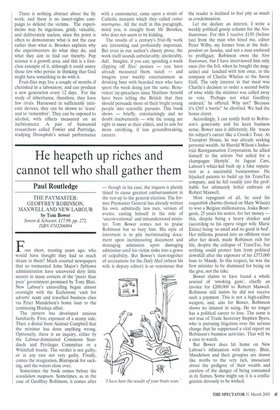He heapeth up riches and cannot tell who shall gather them
Paul Routledge
THE PAYMASTER: GEOFFREY ROBINSON, MAXWELL AND NEW LABOUR by Tom Bower Simon & Schuster, £1799, pp. 272, ISBN 0743206894 Four short, trusting years ago, who would have thought they had so much sleaze in them? Much courted newspapers that so tormented John Major's flyblown administration have uncovered dirty little secrets in many corners of the 'purer than pure' government promised by Tony Blair. New Labour's unravelling began almost overnight with the Ecclestone 'cash for adverts' scam and travelled business class via Peter Mandelson's home loan to the continuing Hinduja affair.
The pattern has developed anxious familiarity. First, exposure of a seamy side. Then, a denial from Alastair Campbell that the minister has done anything wrong. Optionally, there is an inquiry, either by the Labour-dominated Commons Standards and Privileges Committee or a Whitehall trustie. The verdict is not guilty, or at any rate not very guilty. Finally, comes the resignation, Blairspeak for sacking, and the waters close over.
Sometimes the book comes before the scandalum magnum. Sometimes, as in the case of Geoffrey Robinson, it comes after — though in his case, the inquest is plainly timed to cause greatest embarrassment in the run-up to the general election. The former Paymaster General has already written his own, admittedly less racy, version of events, casting himself in the role of 'unconventional' and misunderstood minister. Tom Bower comes not to praise Robinson but to bury him. His style of interment is to pile incriminating document upon incriminating document and damaging admission upon damaging admission until his victim sinks into a grave of culpability. But Bower's slam-together of accusations for the Daily Mail (where his wife is deputy editor) is so venomous that
the reader is inclined to feel pity as much as condemnation.
Let me declare an interest. I write a weekly political gossip column for the New Statesman. For this I receive £150 (before tax) from the man who hired me, editor Peter Wilby, my former boss at the Independent on Sunday, and not a man enslaved to profligacy. Robinson owns the New Statesman, but I have interviewed him only once (for the /oS, when he bought the magazine) and lunched with him once, in the company of Charlie Whelan at the Savoy Grill. The only interest in that meal was Charlie's decision to order a second bottle of wine while the minister was called away to vote. 'Perhaps not what Geoffrey ordered,' he offered. Why not? 'Because it's £365 a bottle!' he chortled. We had the house claret.
Accordingly, I can testify both to Robinson's generosity and his keen business sense. Bower sees it differently. He traces his subject's career like a Crook's Tour. At Transport House, he was already seeking personal wealth. At Harold Wilson's Industrial Reorganisation Corporation, he allied himself to the unions 'but ached for a champagne lifestyle'. At Jaguar Cars, Labour's whizz-kid built up a fake reputation as a successful businessman. He hijacked patents to build up his TransTec company, and he fell readily into the profitable but ultimately lethal embrace of Robert Maxwell.
Most repugnant of all, he used his coquettish charms (honed on Mary Wilson) to woo a Belgian millionairess, Joska Bourgeois, 25 years his senior, for her money — this, despite being a heavy drinker and (according to his opera singer wife Marie Elena) being 'so small and no good in bed'. Her millions, poured into an offshore trust after her death. made Robinson rich for life, despite the collapse of TransTec, but nothing could protect him from political downfall after the exposure of his 073,000 loan to Mandy. In this respect, he was the first minister to be dismissed for being on the give, not the take.
Bower claims to have found a whole• arsenal of 'smoking guns', chiefly an invoice for £200,000 to Robert Maxwell. Robinson still insists he did not receive such a payment. This is not a high-calibre weapon, and, alas for Bower, Robinson shows no interest in suing. He no longer has a political career to lose. The same is not true of Trade Secretary Stephen Byers, who is pursuing litigation over the serious charge that he suppressed a vital report on Robinson's business activities. That will be a case to watch.
But Bower does hit home on New Labour's infatuation with money. Blair, Mandelson and their groupies are drawn like moths to the very rich, insouciant about the pedigree of their wealth and careless of the danger of being consumed in its flames. Some might say it is a conflagration devoutly to be wished.


























































































 Previous page
Previous page